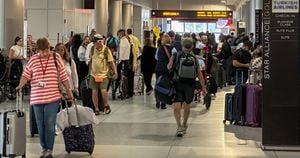Recently, West Virginia's government made the difficult decision to terminate its subsidy program for GLP-1 medications, which are primarily used to manage Type 2 diabetes and obesity. This move has left many residents scrambling to afford these life-altering drugs, which can cost upwards of $1,000 without financial assistance.
The GLP-1, or glucagon-like peptide-1, drugs have gained popularity not just as diabetes treatments, but also as tools for weight loss. Reports have indicated dramatic weight loss achievements for many individuals using these medications, prompting higher demand and usage. Amid rising obesity rates and diabetes incidence, states like West Virginia sought to provide financial support with the subsidized program. That support, now gone, is leaving patients with serious concerns about mounting healthcare costs.
Jessica, a 56-year-old resident whose health has greatly improved since starting treatment on one of the GLP-1 drugs, shared her distress over the program's end. "I can't afford to go back to my old ways and risk my health just because I can't find the funds to pay for my medication. It feels hopeless," she remarked, highlighting the emotional burden this has caused. Jessica isn't alone; numerous West Virginians have found themselves similarly affected.
Advocates and healthcare providers had lauded the state’s subsidy initiative, recognizing its significance for low-income residents who had previously struggled to access proper healthcare. With obesity and diabetes contributing significantly to healthcare costs and complications, many viewed the subsidy as a necessary lifeline. Dr. Patel, a local endocrinologist, pointed out, “This subsidy was more than just financial support; it was about empowering patients to take control of their health.” Critics of the subsidy’s termination argue it undermines efforts to address healthcare disparities.
Since the launch of the subsidy program, West Virginia has seen notable improvements among many patients, contributing to overall lower obesity and diabetes rates within the state. The program was established with the goal of transforming health outcomes, particularly among marginalized communities who often face the greatest barriers to accessing medication and appropriate healthcare.
Yet, balancing state budgets often means difficult financial decisions. West Virginia’s Department of Health and Human Resources cited economic constraints as the driving reason behind this latest choice, stating, “Every budgetary decision weighs heavily on our capability to fund other necessary services.”
For other states observing the situation closely, this scenario serves as both a warning and lesson. Discussions about what tangible steps can be taken to support residents who find themselves stuck between the forced termination of subsidies and inadequate healthcare funding are on the rise. Some are calling for state governments to seek alternatives, such as negotiating lower drug prices with pharmaceutical companies or developing more sustainable healthcare initiatives.
Echoing sentiments from various communities, local advocates are mobilizing to demand policy changes to reinstate such subsidized programs or introduce new ones. This effort has spurred public forums across the state, where healthcare professionals, government officials, and concerned residents come together to brainstorm feasible solutions. Local community leader Maria explained, “If we don’t act now, we’re jeopardizing the health of future generations. It’s simply untenable.”
Experts are also emphasizing the importance of proactive health measures. “We can’t just passively wait for the government to decide our fates,” Dr. Smith, a health policy expert, argued. “We need to springboard from this loss and demand innovative healthcare solutions, including preventive measures.”
For many, the cancellation of West Virginia's GLP-1 subsidy program forces deep reflection on their current healthcare options. The reality is stark: without financial assistance, the costs of GLP-1 medications may deter patients from continuing their lifesaving treatment. This predicament raises more questions about how states will tackle healthcare access and affordability moving forward.
While some West Virginians are turning to community health clinics for guidance, there remains uncertainty. Clinics often operate under limited budgets and can struggle to meet the diverse needs of patients. Some providers are advocating for increased funding to cater to more comprehensive mental and physical health services within these clinics to counteract the fallout from subsidy cutbacks.
Legislators in West Virginia are now under pressure as the consequences of the subsidy’s termination ripple through communities. A coalition of lawmakers is beginning to discuss potential avenues to address these healthcare gaps. Proposals have surfaced, ranging from alternative funding mechanisms to long-term plans for broader health economic reforms.
Despite these discussions, immediate action is necessary. Patients like Jessica face long waits for appointments as healthcare organizations respond to the surge of demand for support. The hope is undeniable among advocates, who believe this moment of crisis could catalyze real substantial change for healthcare accessibility.
“In times like these, we can't afford to be passive. We have to fight for our rights and our health,” Jessica stated, her voice steadfast—a reflection of many voices echoing throughout West Virginia.
For the time being, as the debate continues, those impacted remain caught between financial constrictions and the urgent need for medical treatments. The end of the GLP-1 subsidy has not just created upheaval; it has ignited calls for change across the healthcare spectrum. Residents are determined not to let their health suffer quietly.
Advocates believe engaging the community is key. “It’s about rallying the public, educating them on what’s at stake, and driving forward to demand accountability,” commented Maria. The community stands firm, united by their experiences, as they push for not just reinstated subsidies, but for innovative healthcare strategies and solutions to secure their well-being.
West Virginia's situation highlights the broader struggles faced by individuals across the country when it concerns healthcare access and affordability. If nothing changes, the program's cessation may serve as just another sad statistic—one of many stories of individuals caught between the healthcare system's inadequacies and the need for affordable medication. Patrons at community health centers remain hopeful, drawing strength from their resilience as they advocate for change. The discussion on healthcare accessibility will continue, prompted by these difficult circumstances, as voices demanding health equality grow louder.



